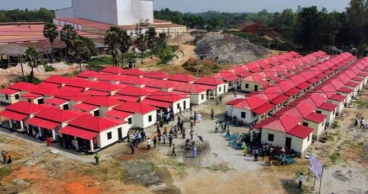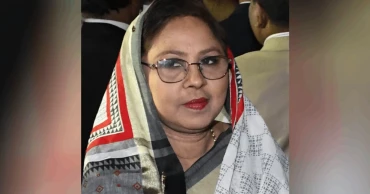poverty
Kurigram looks to new government for solutions to river erosion, jobs crisis
Expectations are running unusually high in the northern district of Kurigram, as residents look to the newly formed government for visible and sustainable solutions to the chronic problems of river erosion and unemployment that have shaped life in the area for decades.
Bordering India and crisscrossed by rivers, Kurigram has long struggled with poverty, unemployment and underdevelopment in education, health care and communications. Locals say repeated promises and short-term projects have failed to deliver lasting change, leaving thousands trapped in a cycle of displacement and economic insecurity.
At least 16 rivers, including the Brahmaputra River, Dharla River, Teesta River and Dudhkumar River, flow through the district. Every year, monsoon floods and erosion eat away homesteads, farmland, schools and roads, forcing hundreds of families to lose their land and relocate, often repeatedly.
Residents say temporary embankments and piecemeal projects have done little to stem the damage. What they want now, they say, is a comprehensive and long-term river management plan involving permanent embankments, regular dredging and science-based river training.
“River erosion destroys our lives every year. Every year we have to battle erosion to survive,” said Shajahan Ali of Baldi Para in Kurigram Sadar upazila, recalling how his family has been displaced multiple times by erosion. “We want a permanent solution.”
Alongside erosion, the lack of employment opportunities has emerged as Kurigram’s most pressing social challenge. With few industries in the district, large numbers of educated and semi-educated youths migrate to Dhaka, Gazipur and Chattogram in search of work, often leaving families behind.
“There is no work here,” said Raju Mia from Char Baraibari village under Bhogdanga union. “We don’t want to leave our families and go to big cities. We want jobs in our own district.”
Sahinur Rahman, a young resident of Jhunkar Char in Jatrapur union, echoed the frustration. “I finished my studies, but there are no jobs. If there were factories here, we could work locally. Instead, we are forced to move to Dhaka.”
Local development advocates argue that the situation can change if the government prioritises Kurigram in its development agenda. They are calling for the establishment of agro-based industries, food processing plants, cold storage facilities, and stronger support for small and medium enterprises, alongside skills development programmes for youths.
PM Tarique urges market restraint ahead of Ramadan
According to Khaja Sharif Uddin Ali Ahmed Rintu, senior vice-president of the Kurigram District Development and Implementation Council, around 1.65 million of the district’s nearly 2.3 million people live in poverty.
“River erosion and decades of mismanagement have repeatedly stripped people of their homes and livelihoods,” he said. “Many NGOs have worked here in the name of poverty reduction, but the lives of ordinary people have not changed much. Proper implementation of development allocations is crucial if poverty is to be reduced.”
Professor Shafiqul Islam Bebu, president of a local char development organisation, said balanced development is key to Kurigram’s future.
“To bring neglected Kurigram forward, we must stop river erosion, improve living standards in char areas and create employment through industrialisation,” he said. “Only fair and equitable distribution of national development resources can ensure sustainable progress here.”
For residents, the message to the new government is clear: move beyond paper plans and political promises to deliver real action on the ground.
“If river erosion is controlled and jobs are created, Kurigram will change,” said one local elder. “People will finally be able to live with dignity, hope and stability.”
As the new administration settles into office, the people of Kurigram wait to see whether this time their long-standing demands will finally translate into lasting change.
13 days ago
No place for extreme poverty in a just society: Wahiduddin Mahmud
Stressing the need for poverty alleviation in Bangladesh, Planning Adviser Dr Wahiduddin Mahmud on Monday said there can be no extreme poverty in a just society as everyone should be given the minimum necessary things to survive.
“Now we should not make any excuse that we cannot provide minimum social security to everyone. Therefore, we must take this poverty alleviation as one of our main objectives,” he said.
The adviser said this while inaugurating the three-day 'National Conference on Social Protection 2025' at the China Friendship Conference Center in Sher-e-Bangla Nagar in the capital.
Bangladesh will never be back to previous times: Planning adviser
Disaster and Relief Management Adviser Faruk-e-Azam was the special guest at the event.
Wahiduddin Mahmud said all must also commit to taking it as an economic and political goal from now on. “While we are poor in terms of expenditure, we are poorer in terms of income. The poverty rate is increasing every year. A large number of people are not poor but are just above the poverty line. Their position is not sustainable, they can become poor with a slight shock,” he said.
He mentioned that some people are standing on the verge of poverty and they will drown at the slightest wave. “They are just making a living in a risky situation.”
Wahiduddin said there is a big problem in determining the beneficiaries in the provision of social allowances and said that currently 50 percent of those who receive allowances are not eligible for this benefit.
Planning Adviser urges planned use of forest resources
“They are getting benefits for ghostly or political reasons. If a nationally coordinated list is prepared and monitored at the field level, the names of the real beneficiaries and the eligible ones will come out,” he said, adding that in an egalitarian state, along with education and healthcare, everyone should be given the minimum necessary things to survive.
“There is no point in giving schools or healthcare centers to those who have no means of livelihood. They are not in a position to receive them.”
He said these two issues are inextricably linked, and the values of independence in 1971 and the mass uprising of July last year were also the biggest issue of building an egalitarian society. “Not everyone's income will be equal, but opportunities must be equal,” he said.
Wahiduddin Mahmud said there are some poverty-stricken areas in the country, and Rangpur was once a seasonal poverty-stricken area. “This seasonal poverty is known as Manga. There was a lot of discussion about Manga in the media around 2003-05.”
“The then government used to deny Manga. It was because of the media that the government recognised Manga and many programmes have been taken to prevent Manga. Currently, there is no such thing as seasonal hunger in the Rangpur region, but poverty is there,” he said.
Wahiduddin said that poverty-stricken areas have been created anew in some other regions of the country like Netrakona, Sunamganj, Satkhira and Patuakhali. “Programmes should be taken to target them.”
"We are in this government for only a few months. Despite this, we want to create a roadmap. If that is done, it will be beneficial for the elected government in the future. They can start from there," he added.
6 months ago
Begging booms in Dhaka while demand for domestic help remains high
From the bustling streets of Dhaka to its narrow lanes and marketplaces, the presence of beggars appears to be growing.
Begging has become a widespread and seemingly convenient means of earning an income. Many of those seeking alms appear capable of working but still choose this path.
At the same time, households across the capital continue to experience a strong demand for homemakers. Yet many women are turning away from this opportunity, opting instead to beg on the streets.
On the scorching pavement in front of the Secretariat last week, a nearly four-year-old child sits quietly with a bowl beside her mother, “Rasheda” (not her real name), aged around 40.
When asked why she begs instead of taking up work, Rasheda replies, “I’m ill. I can’t work.”
She shares that a well-known older man once told her: “You’ve already given birth to three children and can’t feed them. You keep having fatherless babies to increase your sources of income.”
Though visibly uncomfortable, Rasheda stops short of directly responding to the accusation.
In front of Metro Shopping Mall at Dhanmondi 27, 16-year-old Tanzila is also found begging.
Asked about her circumstances, she says, “My mother is a homemaker. My brother is sick. I beg to raise money for his treatment.”
When questioned about her studies, she responds, “Who will care for my brother then? With what I earn from begging, I buy his medicine.”
A middle-aged woman begging on a road in Rampura shares her view, “Working at home doesn’t sustain us. If I work hard physically, my health deteriorates. But if I sit and beg, I can easily make some money.”
At TSC and Suhrawardy Udyan, begging has become a regular sight. Individuals between the ages of 15 and 45 are frequently seen seeking help from passers-by.
Govt zakat fund 'vital' to poverty alleviation: Religious Affairs Adviser
Growing Demand for Homemakers
Households in Dhaka show a considerable demand for homemakers. With more couples engaged in full-time employment, managing work and domestic responsibilities has become increasingly difficult.
Families also seek caregivers for children or elderly members, but reliable help remains scarce.
Shathi Akter, 40, a resident of Banasree, says, “I have a part-time helper, but if she works one day properly, she disappears for three days. I need someone permanent. My mother is sick but I can’t find anyone—even when I pay.”
Padma, 35, who works at a private company, says, “I need a permanent worker to look after my five-year-old. After failing to find someone trustworthy, I reached out to several agencies. Their demands were beyond our means. One agency asked for Tk 10,000 monthly plus a security deposit.”
TIB findings: Over 70 percent of households partake in corruption
Agencies and App-Based Services
Several organisations, including HelloTask and City Maid Agency, offer homemaker services online—although at a substantial cost.
City Maid Agency charges for homemaker services as follows:
8-hour stay – Tk 10,000 plus meals,
10-hour stay – Tk 11,000 plus meals,
12-hour stay – Tk 12,500 to Tk 13,000 plus meals,
24-hour stay – Tk 14,000 to Tk 18,000 including meals and accommodation.
HelloTask offers a two-hour daily package for Tk 2,500–Tk 5,000 monthly, depending on location. For a full-day eight-hour homemaker, the charge is Tk 12,000. They also provide insurance coverage of up to 50 percent of the product value (maximum Tk 20,000) for any unintentional damage, provided it is reported while the homemaker is still present.
Such rates represent significant sources of income—yet many individuals who beg on the streets do not pursue these opportunities.
Micro Finance Institutions should work for reducing urban poverty: BB Governor
Understanding the Persistence of Begging
Tawhidul Haque, Associate Professor of Social Welfare and crime analyst at Dhaka University, observes, “Many people look for the easiest way to earn. Lower-income individuals also want to earn, and they choose the path that seems simplest—begging is among them. Mostly they stand or sit in the street or in front of markets and shopping malls to get aid, even though they are capable of working. When told to work at home, they make excuses. Some even use their children as tools to earn this way.”
“To reduce this trend, their own willingness to work is vital. Volunteer groups could be formed to encourage them. But such initiatives require organisational or individual effort. It’s necessary to let them know that working is more dignified than begging," he added.
8 months ago
Bangladesh has made remarkable gains in poverty reduction in recent years: UN expert
UN Special Rapporteur on extreme poverty and human rights Olivier De Schutter will visit Bangladesh from May 17 to 29, 2023 to examine the government’s efforts to eradicate poverty.
“Bangladesh has made remarkable gains in poverty reduction over recent years, yet important questions remain around how to maintain this progress and ensure all parts of the population benefit equally,” said De Schutter, an independent expert appointed by the UN Human Rights Council to monitor, report, and advise on poverty and human rights around the world.
“My visit will be an opportunity to hear and learn more and provide recommendations to the government on how it can continue to support people out of poverty and ensure the right to an adequate standard of living for all in the face of economic and climate-induced shocks,” he said.
During the visit, the UN expert will travel to Dhaka, Rangpur division and Cox’s Bazar, where he will meet with national and local government officials, individuals and communities affected by poverty, and representatives from civil society.
Read more: Many countries can learn from Bangladesh’s approaches to reducing poverty, empowering women, adapting to climate change: WB President
In addition to investigating the effectiveness of social security programmes, De Schutter will examine the impact of Bangladesh's labour laws, healthcare, housing, and education systems on poverty.
He will also assess the situation of groups disproportionately affected by poverty, including women, children, people with disabilities, and older persons, as well as garment factory workers and Rohingya refugees.
De Schutter will present his preliminary observations and recommendations at a press conference in Dhaka on May 29.
The Special Rapporteur will present his final report on the visit to the UN Human Rights Council in June.
2 years ago
PM Hasina's Ashrayan project is enabling Bangladesh’s inclusive growth, India Today writes
Bangladesh Prime Minister Sheikh Hasina's ‘Ashrayan Project’ under which homes are built for homeless and displaced people in Bangladesh, has played a key role in achieving the goals of poverty eradication, hunger eradication, gender equality and women's empowerment, among others, India’s leading English-language magazine India Today writes.
Her innovative Shelter Scheme, to transform Bangladesh into a developed and prosperous country by 2041, has been able to bring about positive changes in inclusive development by aiming to provide houses for landless, homeless, and marginalized people in 64 districts of the country, writes the magazine in its April 15 issue.
Whereas examples of low-interest loans for land purchase are found in several countries around the world, Bangladesh becomes the first country to offer free land ownership with houses to its marginalized citizens in order to bring its backward communities into the mainstream, India Today notes.
Read: 4 lakh coastal people took refuge at Ashrayan homes during Sitrang: PMO
“Beneficiaries under this scheme are not only provided with accommodation, but they are also provided with various training, daily allowances during training, and loans after training to make them economically self-reliant,” the report states.
“The scheme includes empowering women by giving them half ownership of land and houses, providing free electricity connection, providing clean water by installing one shallow tube well for every 10 families, and providing food assistance under three months of VGF to the resettled families initially,” it reads.
The India Today report also lauded PM Hasina’s development, known as the "Sheikh Hasina model".
The 'Ashrayan Project' is a unique example of how a house can be a major tool for overall family welfare and social development.
Read: Ashrayan Project: Govt thoroughly scrutinizing “irregularities”
In its report, India Today highlighted the experience of two beneficiaries of the project.
For 30 long years, Moksedul, a brick kiln labourer, waited for a house that he could call his own.
His long-held desire has been granted, as he has been assigned a semi-furnished house in his own name.
Moksedul told India Today that he can live very well with his family now.
Meanwhile, sixty-five-year-old Piara Begum is a resident of Patharghata in Barguna who lost her family home to the river thirty years ago.
Read: No laxity in costruction of Ashrayan houses to be tolerated: Project Director
She used to live with her husband on the banks of the river until he died of cancer 16 years ago.
“Finally, Piara Begum's misery has come to an end after she is allotted a house built by the Bangladesh government on the occasion of ‘Mujib centenary’ under the ‘Ashrayan' scheme.” India Today writes.
“I have been suffering all my life. I never dreamed of a house. Now, I have got a semi-furnished house with land. The prime minister has given me a house. I am very happy. As long as I live, I will pray for the prime minister,” she told India Today.
The “Ashrayan” project was undertaken in 1997 under the leadership of Prime Minister Sheikh Hasina. And since its inception, approximately 5,07,244 landless and homeless families have been rehabilitated at various stages under this shelter initiative.
Read More: I’m everyone’s PM irrespective of party affiliation, says Hasina
Through this initiative, the society's backward community has been given access to semi-finished housing and two decimals of land.
2 years ago
No one is starving in Bangladesh, people don’t want panta rice any more: AL MP Chumki
Ruling Awami League MP Meher Afroz Chumki today (April 09, 2023) said no one in Bangladesh is now starving.
“People of the country do not want panta rice any more, they don’t go door to door and beg,” she said.
The MP said this during a discussion on the 50th anniversary of the National Parliament.
Chumki said that poverty has disappeared from Bangladesh.
Read More: Poverty forces Thakurgaon day-labourer to put 7-month-old baby girl up for sale
“We don't deny that prices have been going up. People are suffering all over the world. They are spending money after a lot of consideration. But is there any person in Bangladesh without food? We can proudly say that the people of Bangladesh are not going without food. People do not want panta rice any more, today they want good food and clothes. The country is self-sufficient today,” she said.
Saying that Sheikh Hasina is one of the top global leaders in women's empowerment, Chumki added that the prime minister has appeared for question and answer in parliament for bringing accountability.
Expressing determination to move forward while facing conspiracy, Chumki said this is not 1975, this is 2023. “Country is on track to become Smart Bangladesh in 2041. No one can get away with conspiracy here. We will move forward.”
“Why do we need to seek votes? Because, after killing Bangabandhu, a generation grew up in Bangladesh with wrong and distorted history. They do not know the history of Bangabandhu, they do not know the history of this country,” she said.
Read More: Bangladesh Poverty Watch Report 2022 launched; regular monitoring of progress emphasized
She mentioned that some intellectuals have forgotten that on the eve of victory, intellectuals were killed by the Pakistani army and their collaborators so that this country fails to move forward.
The ruling party MP said that with “false information and exploiting a child by paying him just Tk 10, a section of people have mocked the independence of the country.”
2 years ago
Multiple crises set to plunge more children into poverty, ILO and UNICEF report warns
The number of children without access to social protection is increasing year-on-year, leaving them at risk of poverty, hunger and discrimination, according to a new report released today by the International Labour Organization (ILO) and UNICEF.
According to the report, an additional 50 million children (aged 0-15) missed out on a critical social protection provision – specifically, child benefits (paid in cash or tax credits) – between 2016 and 2020, driving up the total to 1.46 billion children under 15 globally.
“Ultimately, strengthened efforts to ensure adequate investment in universal social protection for children, ideally through universal child benefits to support families at all times, is the ethical and rational choice, and the one that paves the way to sustainable development and social justice,” Shahra Razavi, director of Social Protection Department at the ILO, said.
Child and family benefit coverage rates fell or stagnated in every region in the world between 2016 and 2020, leaving no country on track to achieve the Sustainable Development Goal of achieving substantial social protection coverage by 2030, as per the report.
In Latin America and the Caribbean, for example, coverage fell significantly from approximately 51 percent to 42 percent. In many other regions, coverage has stalled and remains low.
In Central and South Asia, East Asia and Southeast Asia, Sub-Saharan Africa, Western Asia, and North Africa coverage rates have been at around 21 percent, 14 percent, 11 percent and 28 percent respectively since 2016.
Failure to provide children with adequate social protection leaves them vulnerable to poverty, disease, missed education, and poor nutrition, and increases risk of child marriage and child labour.
Globally, children are twice as likely as adults to live in extreme poverty – those struggling to survive on less than US$ 1.90 (PPP*) a day – approximately 356 million children.
A billion children also live in multidimensional poverty – meaning without access to education, health, housing, nutrition, sanitation, or water.
Children living in multidimensional poverty increased by 15 percent during the Covid-19 pandemic, reversing previous progress in reducing child poverty and highlighting the urgent need for social protection.
Moreover, the pandemic highlighted that social protection is a critical response in times of crisis.
Nearly every government in the world either rapidly adapted existing schemes or introduced new social protection programmes to support children and families, but most fell short of making permanent reforms to protect against future shocks, according to the report.
“As families face increasing economic hardship, food insecurity, conflict, and climate-related disasters, universal child benefits can be a lifeline,” said Natalia Winder-Rossi, UNICEF Director of Social Policy and Social Protection.
“There is an urgent need to strengthen, expand and invest in child-friendly and shock-responsive social protection systems. This is essential to protect children from living in poverty and increase resilience particularly among the poorest households.”
The report emphasizes that all countries, irrespective of their level of development, have a choice: whether to pursue a “high-road” strategy of investment in reinforcing social protection systems, or a “low-road” strategy that misses out on necessary investments and will leave millions of children behind.
To reverse the negative trend, ILO and UNICEF urge policymakers to take decisive steps to attain universal social protection for all children, including:
· Investing in child benefits which offer a proven and cost-effective way to combat child poverty and ensure children thrive.
· Providing a comprehensive range of child benefits through national social protection systems that also connect families to crucial health and social services, such as free or affordable high-quality childcare.
· Building social protection systems that are rights-based, gender-responsive, inclusive, and shock responsive to address inequities and deliver better results for girls and women, migrant children, and children in child labour for example.
· Securing sustainable financing for social protection systems by mobilizing domestic resources and increasing budget allocation for children.
Strengthening social protection for parents and caregivers by guaranteeing access to decent work and adequate benefits, including unemployment, sickness, maternity, disability, and pensions.
3 years ago
Bangladesh Poverty Watch Report 2022 launched; regular monitoring of progress emphasized
Regular monitoring of progress is important to assess the degree of convergence between the left behind and the relatively advanced population groups and the lagging and the well-off regions of Bangladesh, says the Bangladesh Poverty Watch Report 2022 on Saturday (January 21, 2023).
The report, jointly prepared by Institute for Inclusive Finance and Development (InM) and Center for Inclusive Development Dialogue (CIDD), aimed to ensure that grassroots voices of ‘left behind’ and extremely poor population groups are heard and these are reflected in policies.
Chairman, CIDD Dr. Mustafa K. Mujeri and Chairman InM Dr. Qazi Kholiquzzaman Ahmad, among others, spoke at the launching event for the Bangladesh Poverty Watch Report 2022.
The Poverty Watch Report 2022 summarised some current aspects of poverty including testimonies, reflections and ‘stories’ of individuals from selected ‘left behind’ population groups belonging to seven plain land ethnic minority groups (Santal, Mal Paharia, Garo, Hajong, Mandi, Oraon and Munda) and the transgender community.
Also read: Poverty forces Thakurgaon day-labourer to put 7-month-old baby girl up for sale
In their ‘stories’, the participants shared their experience of having found themselves in poverty, exclusion and extremely difficult conditions reinforced by systemic errors and structural inequalities.
The Report suggests several priority actions for speeding up their catching up process in society.
The key will be to craft these policies/actions within the broader inclusive development strategies of the government that cover cross-cutting and national level issues, such as strengthening inclusive growth, ensuring financial inclusion, reducing income and social inequality, accessing quality education, health, nutrition and other basic services, adopting appropriate macroeconomic policy, addressing pockets of lagging social groups/regions, and adopting initiatives at the local level along with effectively managing micro-macro transmissions, according to the report.
These left-behind communities have issues that are directly or indirectly related to the daily work of the local governments and local institutions, said the report.
Also read: EU to provide €23 million to PKSF for extreme poverty reduction
For implementing the agenda, one important element will be to utilise the potential of local action to drive development and create appropriate legal and financial frameworks to support all local partners in playing their part in the achievement of the integrated and universal inclusion agenda.
The key is to empower all local stakeholders, especially the local government institutions, aimed at making sustainable and inclusive development more responsive, and therefore, relevant to local needs and aspirations.
The goals will be reached only if local actors including these left-behind communities fully participate, not only in the implementation, but also in the agenda-setting and monitoring processes.
Participation requires that all relevant actors are involved in the decision-making process, through consultative and participative mechanisms, at the local and national levels within the overall inclusion framework, according to the report.
Read More: Colombia seeks Yunus' advice on poverty reduction, 'total peace'
3 years ago
EU to provide €23 million to PKSF for extreme poverty reduction
The European Union (EU) and Palli Karma-Sahayak Foundation (PKSF) Thursday signed a grant agreement to implement a new project for extreme poverty reduction.
PKSF Managing Director Nomita Halder and Maurizio Cian, head of cooperation of the EU Delegation to Bangladesh, inked the agreement worth €22.81 million for the "Pathways to Prosperity for Extremely Poor People (PPEPP)-European Union" Project.
The PPEPP-EU Project will support 215,000 most vulnerable, extremely poor households (about 0.86 million people) in 145 unions of 12 districts where poverty rates are higher than the national average.
The specific objective of the project is to help the target people to rise out of extreme poverty and make significant progress along a pathway towards prosperity.
The project will work in the flood-prone river basin area of the northwestern region (Rangpur, Kurigram, Dinajpur, Thakurgaon, Nilphamari and Gaibandha), cyclone and saline-prone southwestern region (Khulna, Satkhira, Bagerhat, Patuakhali and Bhola), and northeast haor region (Kishoreganj) and some ethnic minority clusters in the north.
PPEPP-EU will work around livelihoods and enterprise development, nutrition and primary healthcare, access to services through community mobilisation, disability inclusion, climate resilience building and women empowerment.
Target groups will include women-headed households, single mothers, elderlies, households with child labour, persons with disabilities, people of the third gender and intersectional groups such as ethnic minorities.
Read more: PKSF launches $200mn project to transform rural microenterprise
3 years ago
1 in 4 Europeans say they are in financially 'precarious' situation: Survey
Many Europeans are now facing hard choices due to a difficult financial situation and more than one in four of them said they are in a "precarious" situation and over half see a serious risk it will become so over the coming months, with an unexpected expense that could push them into poverty, according to a survey.
This feeling is particularly strong in Greece and France.
As the cost of living, driven by higher energy prices, raging inflation and war in Ukraine, tightens their grip, Pollster Ipsos and French anti-poverty NGO Secours Populaire have set up a "European Barometer of Precariousness and Poverty" for the first time to observe the social situation, opinions, and concerns of people in France, the UK, Germany, Greece, Italy and Poland.
Half of more than 6,000 people polled in the six countries, from June 17 to July 6, told Ipsos that their purchasing power had shrunk over the past three years – mainly due to soaring food, fuel, heating and rent bills.
Read: Soaring inflation threatens to unleash political turmoil across Europe
In this "very difficult context, Europeans do not feel secure." Across Europe, rising inflation is behind a wave of protests and strikes that underscores growing discontent with the spiralling cost of living and threatens to unleash political turmoil.
Europeans have seen their energy bills and food prices soar because of the war in Ukraine. Despite natural gas prices falling from record summer highs and governments allocating over $566 billion in energy relief to households and businesses since September 2021, it is not enough for some protesters, according to the think tank Bruegel.
Energy prices have driven inflation in the 19 countries that use the euro currency to a record 9.9 percent, making it harder for people to buy what they need.
"Many Europeans have declared falling into financial difficulties. This situation is particularly difficult in Greece, where 51 percent of respondents said they are in this situation," Ipsos said.
Around 55 percent of Europeans feel that there is a significant risk that they will find themselves in an unstable financial situation in the coming months, with inflation continuing to rise in the continent.
Read: Europe sees fastest pace of rate hikes since euro launched
They have little financial wiggle room, with 64 percent of respondents indicating they are unsure of which expense to cut back on because they have already done so. This anxiety is growing in Italy and Greece and now concerns seven out of 10 people.
"More than one in three Europeans said they have had to restrict their travel recently. More than one in five said they have been cold recently and have not turned up the heating at home. One in seven has even had to ask for the help of relatives or take several jobs," Ipsos said.
"Beyond their own situation, the Europeans see the precariousness around them, particularly in their neighbourhoods, with 41 percent observing that there are many precarious people in their neighbourhoods and 30 percent in their close circle or at work. This difficult situation is particularly worrying in Greece, Italy and Poland."
3 years ago



















